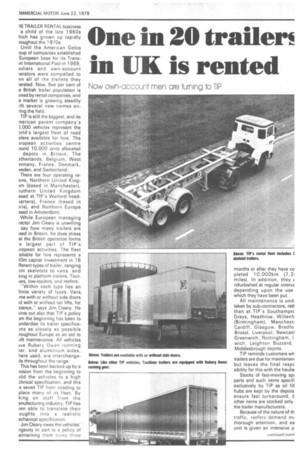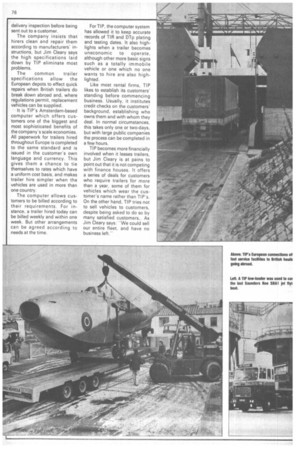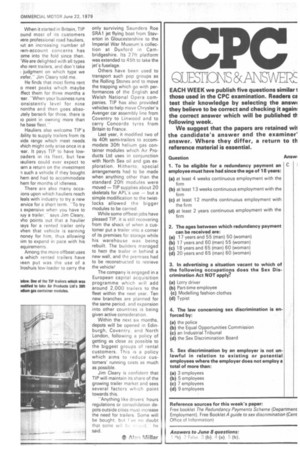One in 20 trailer in UK is rented
Page 77

Page 78

Page 79

If you've noticed an error in this article please click here to report it so we can fix it.
Now own-account men are turning to TIP
iE TRAILER RENTAL business a child of the late 1960s hich has grown up rapidly roughout the 1970s.
Until the American Gelco oup of companies established European base for its Trans in International Pool in 1969, milers and own-account )erators were compelled to vn all of the trailers they ierated. Now, five per cent of e British trailer population is yned by rental companies, and e market is growing steadily ith several new names enring the field.
TIP is still the biggest, and its Tierican parent company's ),000 vehicles represent the Drld's largest fleet of road liters available for hire. The iropean activities centre
ound 10,000 units allocated depots in Britain, The 3therlands, Belgium, West 3rmany, France, Denmark, veden, and Switzerland.
There are four operating reons, Northern United King )rn (based in Manchester), nithern United Kingdom ased at TIP's Watford head Jarters), France (based in iris), and Northern Europe ased in Amsterdam).
While European managing rector Jim Cleary is unwilling say how many trailers are ised in Britain, he does stress at the British operation forms e largest part of TIP's iropean activities. The fleet ailable for hire represents a i0m capital investment in 18 fferent types of trailer, ranging skeletals to vans, and king in platform trailers, Taut iers, low-loaders, and reefers. "Within each type lies an finite variety of types, Vans, rrie with or without side doors id with or without tail lifts, for stance," says Jim Cleary. He iints out also that TIP's policy )m the beginning has been to
3ndardise its trailer specifica
)ns as closely as possible roughout Europe as an aid to ,ift maintenance All vehicles ive Rubery Owen running tar, and aluminium sides, here used, are interchange ile the range.
This has been backed up by a icision from the beginning to iild the vehicles to a high chnical specification, and this is saved TIP from needing to place many of its fleet. By king on staff from the anufacturing industry, TIP has ten able to translate their oughts into a realistic echanical specification,
Jim Cleary owes the vehicles' ngevity in part to a policy of aintaining them every three.
months or after they have co pleted 10,000km (7,21 miles). In addition, they I refurbished at regular interve depending upon the use which they have been put.
All maintenance is und, taken by sub-contractors, rat' than at TIP's Southamptc Grays, Heathrow, Willenh (Birmingham), Manchesti Cardiff, Glasgow, Bradfo .Bristol, Liverpool, Newcasi .Greenwich, Nottingham, I wich, Leighton Buzzard, Middlesbrough depots.
TIP reminds customers wh trailers are due for maintenani but leaves the final respc sibility for this with the haulie Stocks of fast-moving spi parts and such items specifi exclusively by TIP as oil fill hubs are kept by the depots ensure fast turnaround, other items are stocked only the trailer manufacturers, Because of the nature of th traffic, reefers demand mc thorough attention, and ea unit is given an intensive p delivery inspection before being sent out to a customer.
The company insists that hirers clean and repair them according to manufacturers' instructions, but Jim Cleary says the high specifications laid down by TIP eliminate most problems.
The common trailer specifications allow the European depots to effect quick repairs when British trailers do break down abroad and, where regulations permit, replacement vehicles can be supplied.
It is TIP's Amsterdam-based computer which offers customers one of the biggest and most sophisticated benefits of the company's scale economies. All paperwork for trailers hired throughout Europe is completed to the same standard and is issued in the customer's own language and currency. This gives them a chance to tie themselves to rates which have a uniform cost basis, and makes trailer hire simpler when the vehicles are used in more than one country.
The computer allows customers to be billed according to their requirements. For instance, a trailer hired today can be billed weekly and within one week. But other arrangements can be agreed according to needs at the time. For TIP, the computer system has allowed it to keep accurate records of TIR and DTp plating and testing dates. It also highlights when a trailer becomes uneconomic to operate, although other more basic signs such as a totally immobile vehicle or one which no one wants to hire are also highlighted.
Like most rental firms, TIP likes to establish its customers' standing before commencing business. Usually, it institutes credit checks on the customers' background, establishing who owns them and with whom they deal. In normal circumstances, this takes only one or two-days, but with large public companies the process can be completed in a few hours.
TIP becomes more financially involved when it leases trailers, but Jim Cleary is at pains to point out that it is not competing with finance houses. It offers a series of deals for customers who require trailers for more than a year, some of them for vehicles which wear the customer's name rather than TIP's. On the other hand, TIP tries not to sell vehicles to customers, despite being asked to do so by many satisfied customers,. As Jim Cleary says: ''We could sell our entire fleet, and have no business left." When it started in Britain, TIP ound most of its customers were professional road hauliers, iut an increasing number of iwn-account concerns has ome into the fold since then. 'We are delighted with all types vho rent trailers, and don't take judgment on which type we irefer,' Jim Cleary told me. He finds that most firms rent o meet peaks which maybe iffect them for three months a ear. "When your business runs .onsistently level for nine nonths and then goes absoit* berserk for three, there is io point in owning more than he base fleet."
Hauliers also welcome TIP's ibility to supply trailers from its vide range which meet needs vhich might only arise once in a ear. It pays TIP to have lowaaders in its fleet, but few laullers could ever expect to lam a return on the investment 1 such a vehicle if they bought hem and had to accommodate hem for months of idleness.
There are also many occaions upon which hauliers reach leals with industry to try a new ervice for a short term. "To try expensive when you have to ouy a trailer," says Jim Cleary, vho points out that a haulier iays for a rented trailer only vhen that vehicle is earning noney for him, thus allowing tim to expand in pace with his equirements.
Among the more offbeat uses o which rented trailers have been put was the use of a roshuis low-loader to carry the only surviving Saunders Roe SRA1 jet flying boat from Stayerton in Gloucestershire to the Imperial War Museum's collection at Duxford in Cambridgeshire. Its 27ft platform was extended to 45ft to take the jet's fuselage.
Others have been used to transport such pop groups as the Rolling Stones and to move the trapping which go with performances of the English and Welsh National Opera companies. TIP has also provided vehicles to help move Chrysler's Avenger car assembly line from Coventry to Linwood and to carry Concorde tyres from Britain to France.
Last year, it modified two of its 4011 semi-trailers to accommodate 30ft helium gas container modules which Air Products Ltd uses in conjunction with North Sea oil and gas exploration. Hitherto, special arrangements had to be made when anything other than the standard 20ft modules were moved — TIP supplies about 20 skeletals for APL's use — but a simple modification to the twistlocks allowed the bigger modules to be carried.
While some offbeat jobs have pleased TIP, it is still recovering from the shock of when a customer put a trailer into a corner of its premises for storage while his warehouse was being rebuilt. The builders managed to hem the trailer in behind a new wall, and the premises had to be reconstructed to retrieve the vehicle!
The company is engaged in a European capital acquisition programme which will add around 2,000 trailers to the fleet within the next year. Ten new branches are planned for the same period, and expansion into other countries is being given active consideration.
Within the next six months, depots will be opened in Edinburgh, Coventry, and North' London, following a policy of getting as close as possible to the biggest groups of rental customers. This is a policy which aims to reduce customers' running costs as much as possible.
Jim Cleary is confident that TIP will maintain its share of the growing trailer market and sees several factors which point towards this.
"Anything like drivers hours regulations or consolidation depots outside cities must increase the need for trailers. Some will be bought, but I no doubt
that some w: l: he said.




























































































































































































